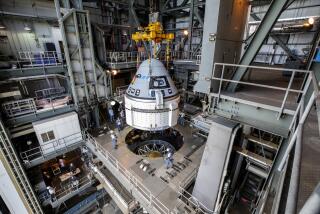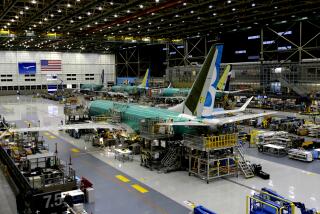All Nippon Airways grounds Boeing Dreamliners due to engine issue
- Share via
Five of Boeing Co.’s new 787 Dreamliner commercial airplanes belonging to Japanese carrier All Nippon Airways have been grounded because of corrosion found in jet engines during testing.
The Dreamliner, a twin-aisle aircraft that seats 210 to 290 passengers, made its first passenger flight with All Nippon Airways in October. But it was more than three years late because of design problems and supplier issues.
The latest problem was caused by changes to a manufacturing process, Boeing said Monday. The changes caused some of the crown gears to corrode within the gear box, the company said. The flaw was discovered during testing by the engine’s maker, Rolls-Royce.
All Nippon Airways owns 11 Dreamliners. The airline “is removing the five airplanes with affected parts from active service until they can replace the gearboxes,” Boeing spokesman Scott Lefeber said.
By late Monday, All Nippon Airways confirmed that three of the affected Dreamliners had been returned to service with replacement parts.
“The replacement is expected to be complete in the days ahead,” Lefeber said. “No airplanes will be delivered with affected parts.”
Corrosion is the most recent problem with the Dreamliner. Shortly after delivery of the first aircraft, All Nippon Airways reported a problem with landing gear. In March, Boeing had to slow Dreamliner deliveries because the sheets of laminated composite materials that make up the plane’s body were separating.
Through June, Boeing has taken 845 orders for the Dreamliner from airlines and aircraft leasing firms around the world. Depending on the version of Dreamliner ordered, the plane will cost between $185 million and $218 million.
ALSO:
Drone makers urge U.S. to let them sell more overseas
Air Force preps to end C-17 line at Boeing’s Long Beach plant
GenCorp buys Canoga Park rocket engine maker Rocketdyne
Follow W.J. Hennigan on Twitter @wjhenn
More to Read
Inside the business of entertainment
The Wide Shot brings you news, analysis and insights on everything from streaming wars to production — and what it all means for the future.
You may occasionally receive promotional content from the Los Angeles Times.











